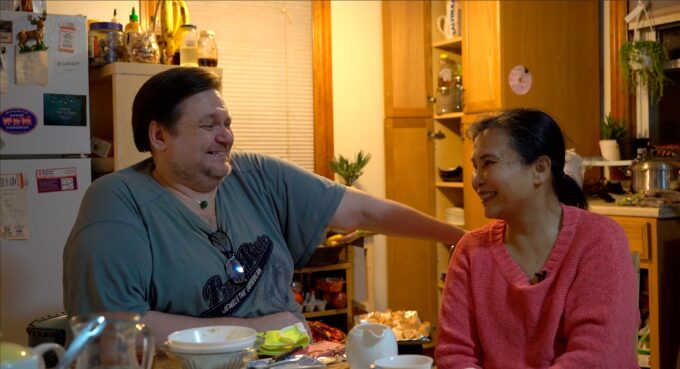Written By: Huizhu Pan
A woman’s status in her family has long been a controversial topic in China. Given the hundreds of years of feudal history during which “A man can have multiple wives, but a woman cannot marry twice” (“Lessons for Women,” Zhao Ban 45-117 AD), divorced or widowed women’s circumstances in modern Chinese society are still worth discussing. In her debut documentary feature “Export My Love,” director Jinglin Li follows four such Chinese women who try to pursue love and a better life by seeking American husbands.
The protagonists — Jany, Bobo, Lihua and Jessica — have various educational and financial backgrounds. Still, they all more or less have experienced “son preference” and low women’s status in county-level cities in southern China. Born in the 1950s, Jany is the only one who has a bachelor’s degree in English and owns her own business. During her two marriages before she married someone abroad, she was disliked by both husbands just for birthing baby girls. To her, immigrating to America with her second daughter Cindy was a life-changing decision. Thus, she tries to help more women like her to seek opportunities for a better life.
Yet, I don’t agree with Jany’s value of starting a new life through marriage. Instead of protecting the women from being judged by age and marital status, she keeps exerting pressure on them to marry American men as their only way to pursue happiness. What’s worse, Jany becomes pushy when instructing Jessica, a single mother of two children. She not only helps with translating Jessica’s texts with her match on the dating app, but also pushes her to find a mate as soon as possible. Given that Jessica is Jany’s best friend’s daughter, Li clarified, “She believes she is doing good to help Jessica seek a good husband.” In my view, Jany ties a woman’s value to her marriage. She is one of the victims of gender inequality who doesn’t realize it, but in turn reciprocates the unequal value on other women.
Talking about Jany’s motif of starting this “Marrying Abroad Project,” Li said, “I don’t think it’s a right or wrong issue. Jany offers help to limited friends for free, giving them a choice of seeking love.” Believing that these women have their rights to attain happiness, Li tried to present their stories as objectively as possible, instead of judging them through her lens. However, not every protagonist is pursuing love. Bobo, for example, reached out to Jany for help even before her husband passed away from cancer, claiming that she wanted to plan for her son’s future as early as possible. In our interview, Li also mentioned that “Bobo cares a lot about her match’s salary and occupation. And she wants to marry someone rich to improve their living condition.”
Bobo’s unrealistic illusion of the West reflects a common idea among her generation. Growing up in the 1970s-1980s, when China was going through a social revolution, its values were largely shaped by the social context. Since China’s reform and opening-up policy was first put into effect in 1978, more foreign enterprises and cultures came into China, bringing a great shock to the generation. Many Chinese people who had suffered from the old system would rather accept the new Western ideology, making living in the U.S. a dream for many of them.

In our conversation, I was impressed by Li’s point that “These women are passive but not submissive.” Li even admires the women in that “They dare to learn about a completely new culture and take the chance to change their life.” Indeed, some of the protagonists’ actions, such as using dating apps to actively seek ideal partners and unabashedly introducing their children to their dates, show a progress of women’s consciousness compared to the feudal times. Yet, they are still trapped in the shackles of patriarchal ideology.
When the women deem marriage with a decent well-off American man as “good fortune,” they do not consider themselves as independent individuals. According to Jany’s experience, many American men would prefer Asian homemakers. Thus, she instructs Bobo to learn in-house care and take artistic photos to attract more people. During their preparation, the women become objectified and unconsciously “price” themselves with housekeeping skills and appearance. In other words, they are fighting for a better life, but a life dominated by men.
Besides, for most of the characters, they would like to sacrifice themselves for their children. It partly attributes to China’s one-child policy and the son-preference tradition. After divorces or losing husbands, they gain nothing from the marriage except for their children. For Jany, she doesn’t want her daughter to experience what she has. Thus, finding her daughter a reliable father matters more than seeking love for herself. And she passes the value on to her daughter as well as the women she helps. Again, this all reflects women’s social status formed by a long depressive history.
Although Li is a young director born in the 1990s, she can still feel the social pressures on single women. “I’m 28 this year, and a woman at my age is supposed to get married in my cultural ideology. My mom is pushy sometimes, just like the way Jany treats Jessica in the documentary,” Li said. “They always say things like women’s value will reduce after a certain age and that they have to lower their dating expectations.” And there are also many moments when Li couldn’t relate to her characters. She recalled, “I had difficulty shooting Bobo. Because I couldn’t imagine myself in her position. It took me time to not let my emotions affect my cinematography. ”
Talking about her purpose of making the documentary, Li stated that “I want to show my audiences that in some small cities in China, a group of women like Jessica, Bobo and Lihua exist. They are facing dilemmas because of the problematic women’s social status. And there is still a long way to go to fight for women’s rights.”
“Export My Love” makes its World Premiere at the 43rd Asian American International Film Festival. Ticket and screening information can be found here.

